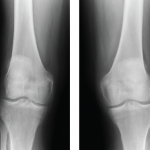(Reuters Health)—Grating, cracking or popping sounds around joints may predict future arthritis, especially in the knees, according to a recent U.S. study.
Among thousands of people with no knee pain who were followed for three years, one quarter had noisy knees yet they made up three quarters of the cases of symptomatic knee arthritis that emerged by the end of the study period, researchers found.
“Many people who have signs of osteoarthritis on X-rays do not necessarily complain about pain. Presently, there are no known strategies for preventing the development of pain in this group,” said lead study author Grace Lo of Baylor College of Medicine in Houston, Texas.
Especially when people have joint space loss or other arthritis-related changes visible on X-rays, their also having noisy knees can be considered a sign of higher risk for developing pain within the next year, she said.
Osteoarthritis is the most common form of arthritis, affecting more than 30 million adults in the United States, Lo and colleagues write May 4th in Arthritis Care and Research. Symptomatic knee osteoarthritis affects about 16 percent of adults older than 60, they note.
Lo and colleagues analyzed data from 3,495 participants ranging in age from about 50 to 70 in a long-term study conducted in hospitals in Rhode Island, Ohio, Pennsylvania and Maryland. None had symptomatic knee arthritis at the start.
The researchers looked at how often people experienced knee pain, stiffness and “crepitus,” or noises and scraping feelings in their knees.
During clinic visits, people were asked questions like, “Do you feel grinding, hear clicking or any other type of noise when your right knee moves?” and “During the past 12 months, have you had pain, aching or stiffness in or around your right knee on most days for at least one month?” The patients were evaluated at the beginning of the study and again at 12, 24 and 36 months. X-rays were also taken once a year.
At the start, 65 percent of participants said they had no crepitus, 11 percent experienced it “rarely,” 15 percent had it “sometimes” and 9 percent had it “often” or “always.”
Overall, 635 participants, 18 percent, developed symptomatic arthritis of the knee during the study period.
Even after adjusting for weight and other factors, researchers found that odds of developing symptomatic arthritis rose along with the frequency of crepitus. Those who reported it “rarely” had 50 percent higher risk than those who never had it, and those with crepitus “sometimes” or “often” had about double the odds.

